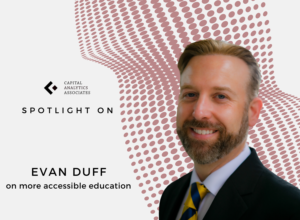Spotlight On: Evan Duff, President, North Carolina Wesleyan University
 July 2023 — In an interview with Invest:, Evan Duff, president of North Carolina Wesleyan University, emphasized the university’s role in the region as a major employer and the only four-year undergraduate institution within the county. The university’s priorities include expanding partnerships, ensuring program accessibility and implementing best practices for working adults, he said.
July 2023 — In an interview with Invest:, Evan Duff, president of North Carolina Wesleyan University, emphasized the university’s role in the region as a major employer and the only four-year undergraduate institution within the county. The university’s priorities include expanding partnerships, ensuring program accessibility and implementing best practices for working adults, he said.
What is the role of the University in the region?
We are embarking on an economic impact study that will really define that. We are one of the top employers in this area when you account for faculty, staff, and part-time positions. We are also the only four-year institution in this region offering undergraduate and graduate degrees. We serve the community in various ways by doing community service, serving in associations and giving back to local foundations.
How is the university helping to develop the future workforce?
We partner with our local community colleges, especially when it comes to trades and economic development. Some of the ways we directly impact economic development is through our teacher education program, which leads to supporting the shortage of educators in North Carolina. We also offer a 12-month BSN program to help nurses achieve their bachelor’s degree and that is 100% online. Based on research, employers are seeking candidates who excel in soft skills like a positive work ethic, collaboration, effective communication, all of which we teach at NC Wesleyan training areas are soft skills like work ethic, collaboration, effective communication and so on. Most industry leaders will tell you that they can train technical skills, but those soft skills are harder to train. That is why we make sure that students leave the classroom holistically developed for the workforce and life in general.
What are some of the trends you are seeing in higher education?
I would say the top thing on everyone’s mind is AI and how technology like ChatGPT is changing the landscape. The marketing field is going to be very different and that is just one of many examples of how technology can be leveraged. This means institutions like ours have to stay ahead of the curve. AI will drastically change how institutions recruit and educate students.
What strategies do you have in place in regard to DEI?
We have always had a rich history of diversity on this campus because we are a minority serving institution. In addition to that, we serve a great deal of international students and students from diverse backgrounds. As a result, we have been intentional in the last five to 10 years about how we continue fostering that kind of culture. We are also diverse in the types of students we serve, expanding our reach to adult learners. We were recently named the most affordable private institution in North Carolina by the New York Times and so we understand the importance of making education affordable for all of our students. This generally tends to help increase diversity. We pride ourselves on helping students feel that they belong, regardless of their age or background.
Can you expand on some of the strategies you are using to ensure affordability?
We connect donors with endowed scholarships. The larger your endowment is, the more money you can give to the student without utilizing institutional aid. In higher education, there is a sticker price but in most private institutions no one is paying that because of scholarships or internal institutional aid or grant money. We provide scholarships and discounts to our adult population and try to have contingency funds to help students through difficult situations. Those are the most significant ways we address affordability, but I think there could be some additional aid that comes when Pell grants increase at the federal level. We don’t want students to leave with high amounts of debt, so we are very conscious of that.
What are your priorities for the near term?
We have a lot of partnerships with most of the community colleges across the state. We are also partnered with specific local organizations and are looking to expand partnerships that support organizations employees with furthering their education. We feel their employees deserve access to a high-quality degree that we can provide at a discount and that doesn’t interfere with their work schedules. This promotes economic development by developing the human capital at these organizations. Our programs are always accessible in an online or hybrid format. We will continue implementing best practices for working adults looking at prior learning credit from on-the-job training programs and prior education. That is the market that will continue to grow despite the decline we have seen over the last few years.
For more information, visit:













